MS Information Systems Versus MS Information Technology

Which Program is Right for You?
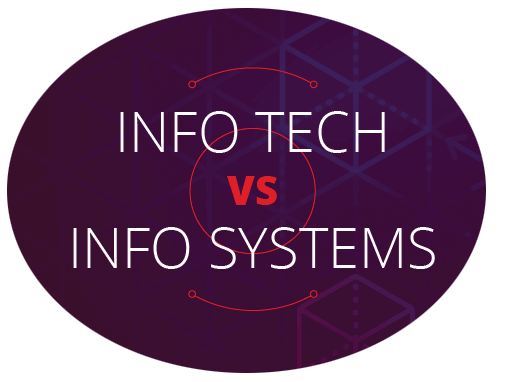
What is the Difference Between Information Technology and Information Systems?
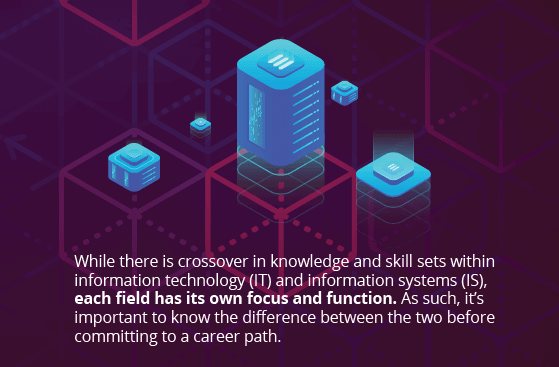
- Information systems, sometimes called information systems technology, is an umbrella term for the systems, people, and processes that create, store, and disseminate information. Professionals in the field are data-driven, communicating the value of relevant information and offering suggestions to help business leaders make decisions.
- Information technology is the development and management of technology utilization to advance business goals within an organization. Professionals in the field focus on the big picture, thoughtfully designing, implementing, supporting, and managing computer-based networks, systems, and applications.
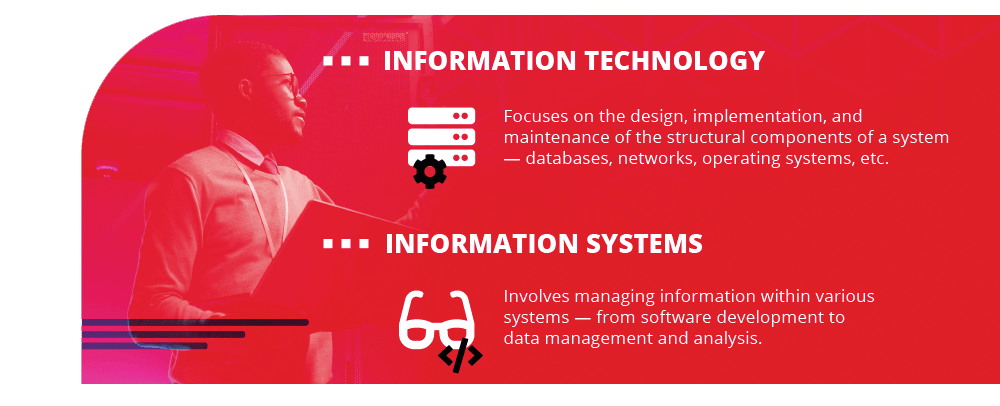
What Skills do you Need to Succeed in IT Versus IS?
IT and IS experts often share many of the same traits. They are tech-savvy, adaptable, detail-oriented, and — perhaps most importantly — strategic in the ways they choose to think and act. But while both specialties attract similar dispositions, to become a well-rounded professional in your chosen field you’ll need to balance your skillset with the ‘hard’ and ‘soft’ skills specific to your discipline — skills that allow you to take on any situation with confidence.
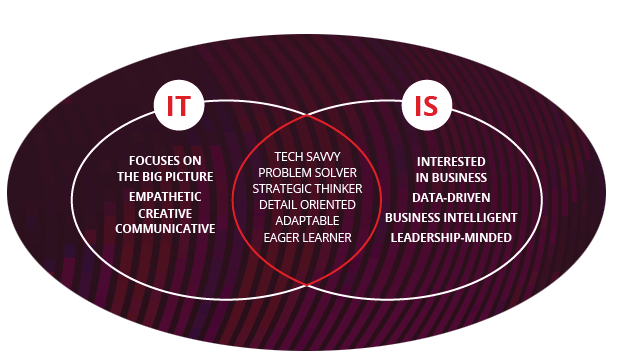
- Leadership — to connect technology, people, and processes.
- Problem-solving — to establish systems or processes that mitigate obstacles.
- Business intelligence — to help organizations make data-driven decisions.
- Project management — to achieve specific objectives within agreed parameters.
Essential IT skills include:
- Communication — to convey technical information in a way that is easy to understand.
- Creativity — to anticipate industry changes and craft solutions for potential issues.
- Data analytics — to analyze raw data for insights, patterns, and trends.
- Cybersecurity — to protect networks from information disclosure, theft, or damage.

What is the Job Outlook for IT Versus IS?
With an increasing need for innovative specialists who understand how businesses use technology to accomplish their goals, both IS and IT offer a variety of careers when combined with relevant work experience. The U.S. Bureau of Labor Statistics (BLS) projects that the number of IS jobs will grow 11% and that IT jobs will increase 13% by 2030. Each of these is faster than the average for all other occupations. Careers in both IT and IS cover a wide range of industries, from public and private businesses to healthcare and government. As the world becomes more technology-driven and data-managed, opportunities will continue to grow. Common IT jobs include:
- Computer and information research scientists — design innovative uses for new and existing technology.
- Computer network architects — design and build data communication networks, such as local- and wide-area networks and intranets.
- Information security analysts — plan and manage security measures to protect computer networks and systems.
Common IS jobs include:
- Analytics consultants — develop and implement analytics solutions to increase consumer brand awareness and revenue.
- System analysts — interpret business processes and systems to identify opportunities for improvement and design solutions.
- Information systems managers — lead teams of technology professionals to maintain an organization’s systems and technology needs.
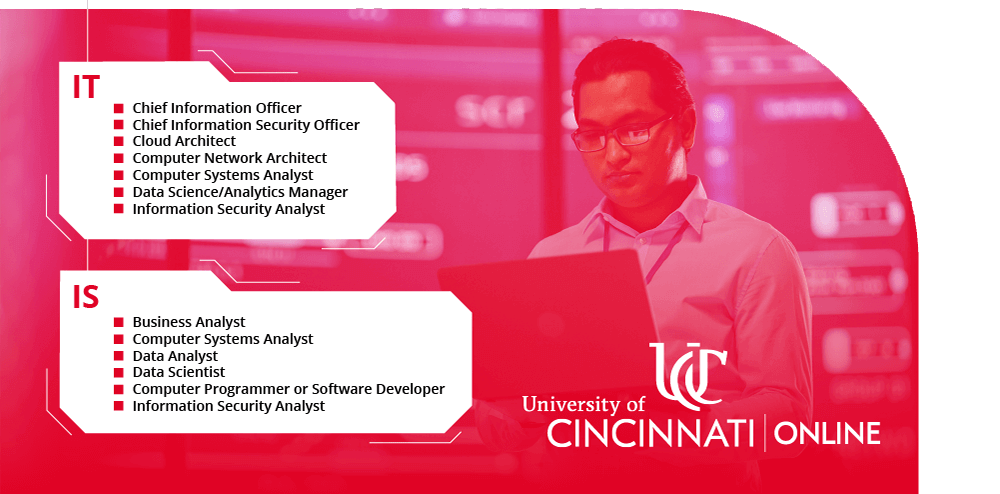
What Relevant Master’s Programs does UC Online Offer?
The University of Cincinnati Online boasts a top-15 MSIS and a top-10 MSIT program. Each fully-online program is led by faculty at the forefront of their industries — with extensive business and academic expertise — and is ideal for both part- and full-time students. Graduates from UC Online computer science programs develop a broad foundation in all aspects of technology from data and security to infrastructure and systems administration. The depths with which these skills will be leveraged depends on the direction you take post-graduation - IT diving more into the physical build of architecture and infrastructure; IS leaning more towards data and analysis.
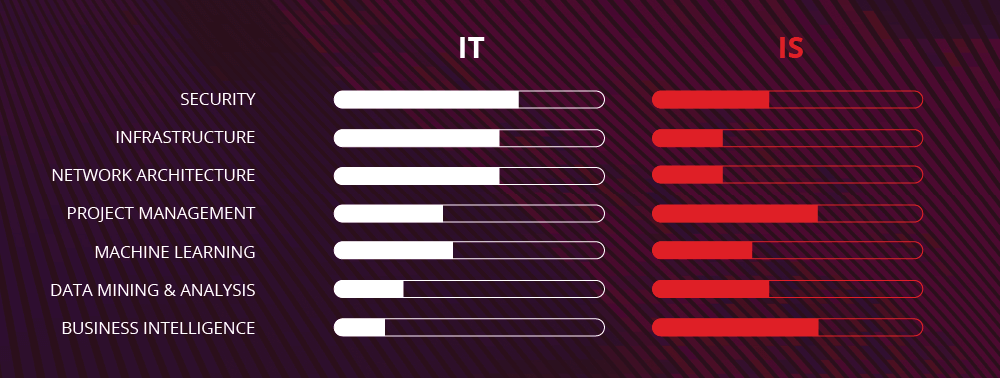
- The Master of Science in Information Systems combines core business knowledge and IS technical courses with real-world opportunities. The curriculum for this program dives into information systems. You'll study the analysis, design, and development of information systems and focus on collecting, organizing, analyzing, and securing data. Business courses include foundations in finance, marketing, and information and technology management. The program culminates in an experiential component. You'll choose between three options: a co-op/internship, an independent project, or information systems research, which will pack your resume with practical work experience. Upon graduating, you’ll be prepared to design solutions that help data-driven companies reach top-business goals.
- The Master of Science in Information Technology is a highly customizable program that utilizes IT solutions in multiple industries. The curriculum includes coursework in cybersecurity, IT infrastructure, mobile development, and human-computer interaction. The program culminates in an experiential component where you’ll select either a final capstone or thesis, allowing you to investigate an IT solution systematically. Upon graduating, you’ll be prepared to create solutions that enhance business through technology.
Choose Your Path
Information systems and information technology may be related at first glance, but the deeper you dive into the details the more distinct each program becomes. No matter which field you decide to pursue, UC Online has the program you need to get the career you want — from analytics consultant to network architect. Are you ready to learn more? Explore our online programs to discover how you can achieve your goals with a master’s in information systems or a master’s in information technology. Take the first step in advancing your career by beginning your application today.